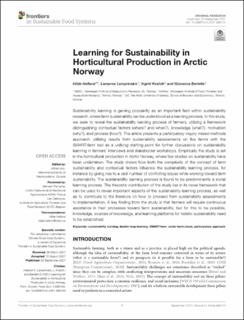| dc.contributor.author | Halland, Hilde | |
| dc.contributor.author | Lamprinakis, Lampros | |
| dc.contributor.author | Ingrid, Kvalvik | |
| dc.contributor.author | Bertella, Giovanna | |
| dc.date.accessioned | 2021-10-11T12:45:25Z | |
| dc.date.available | 2021-10-11T12:45:25Z | |
| dc.date.created | 2021-09-20T07:32:03Z | |
| dc.date.issued | 2021-09-20 | |
| dc.identifier.citation | Halland H, Lamprinakis L, Kvalvik I and Bertella G (2021) Learning for Sustainability in Horticultural Production in Arctic Norway. Front. Sustain. Food Syst. 5:686104. | en_US |
| dc.identifier.issn | 2571-581X | |
| dc.identifier.uri | https://hdl.handle.net/11250/2789060 | |
| dc.description.abstract | Sustainability learning is gaining popularity as an important field within sustainability research, where farm sustainability can be understood as a learning process. In this study, we seek to reveal the sustainability learning process of farmers, utilizing a framework distinguishing contextual factors (where? and when?), knowledge (what?), motivation (why?), and process (how?). The article presents a participatory inquiry mixed-methods approach, utilizing results from sustainability assessments on five farms with the SMART-farm tool as a unifying starting point for further discussions on sustainability learning in farmers’ interviews and stakeholder workshops. Empirically the study is set in the horticultural production in Arctic Norway, where few studies on sustainability have been undertaken. The study shows how both the complexity of the concept of farm sustainability and contextual factors influence the sustainability learning process, for instance by giving rise to a vast number of conflicting issues while working toward farm sustainability. The sustainability learning process is found to be predominantly a social learning process. The theoretic contribution of the study lies in its novel framework that can be used to reveal important aspects of the sustainability learning process, as well as to contribute to the literature on how to proceed from sustainability assessments to implementation. A key finding from the study is that farmers will require continuous assistance in their processes toward farm sustainability, but for this to be possible, knowledge, sources of knowledge, and learning platforms for holistic sustainability need to be established. | en_US |
| dc.language.iso | eng | en_US |
| dc.publisher | Frontiers Media S.A. | en_US |
| dc.rights | Navngivelse 4.0 Internasjonal | * |
| dc.rights.uri | http://creativecommons.org/licenses/by/4.0/deed.no | * |
| dc.title | Learning for Sustainability in Horticultural Production in Arctic Norway | en_US |
| dc.type | Peer reviewed | en_US |
| dc.type | Journal article | en_US |
| dc.description.version | publishedVersion | en_US |
| dc.rights.holder | © 2021 Halland, Lamprinakis, Kvalvik and Bertella | en_US |
| dc.source.pagenumber | 18 | en_US |
| dc.source.volume | 5 | en_US |
| dc.source.journal | Frontiers in Sustainable Food Systems | en_US |
| dc.identifier.doi | 10.3389/fsufs.2021.686104 | |
| dc.identifier.cristin | 1935699 | |
| dc.source.articlenumber | 686104 | en_US |
| cristin.ispublished | true | |
| cristin.fulltext | original | |
| cristin.qualitycode | 1 | |

